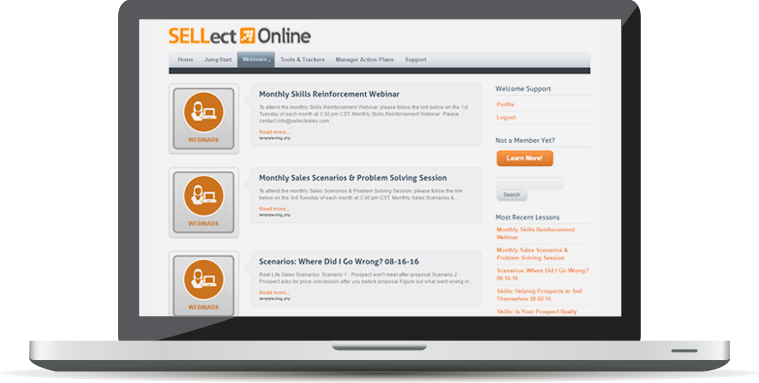Your sales team is essential to growing your business and has a major impact on your brand reputation. Whether you’re starting a sales consulting business or growing your internal team, selling methodologies provide salespeople with a practical, repeatable, adaptable foundation for sales success.
“Trust me, your prospects have a system for buying and if you don’t have a system for selling you will default to their system for buying… or should I say stalling, objecting, negotiating away your profit and not buying,” says Merit Kahn, CEO of SELLect Sales Development and co-host of The Smarter Sales Show podcast.
To help your sales team continue to grow, we’ve compiled a list of the top 10 sales methods so you can determine which one is best for your business.
“Sure, I’d love people to use the SELLect Sales Methodology, but honestly, pick any one of the systems on the list and use it… it’s the salespeople who wing it out there that give the rest of us who are serious about the profession a bad rap,” says Kahn.
What Is a Sales Methodology?
A sales methodology is a framework that outlines your sales process. While a sales process is a map of specific stages required for success, a sales methodology is a system of guiding principles for how to act within and between the stages.
Top 10 Sales Methodologies
These sales methods are designed to add focus and clarity to each stage of the buyer’s journey.
- The Challenger Sale
- Conceptual Selling
- Consultative Selling
- Customer-Centric Selling
- Inbound Selling
- The Sandler Selling System
- SELLect Sales Methodology
- Solution Selling
- SPIN Selling
- Value Selling
The Challenger Sale
The challenger sales methodology suggests that every salesperson fits into one of five personas:
- Relationship builders
- Hard workers
- Lone wolves
- Reactive problem solvers
- Challengers.
According to the book, “The Challenger Sale,” challenger-type sellers are most successful, especially in the B2B enterprise market. Studies have found that this approach is the best solution to complex sales conditions. Challengers have a different view of the world, understand the customer’s business, love to debate, and aim to push the customer to get out of their comfort zone.
Challenger salespeople are known for using the teach-tailor-take approach where the seller first teaches the customer about the industry, then tailors a solution that will fit the customer’s exact needs, and finally, they take control of the sale by leading the customer to the idea.
Conceptual Selling
Conceptual selling is based on the idea that customers don’t buy a product or a service, rather they buy the concept of a solution the product represents.
Instead of leading with a pitch, this method encourages salespeople to determine their prospect’s concept of the product and understand their decision-making process. While uncovering this information, it is the salesperson’s job to incorporate the product or solution into the conversation as naturally as possible.
This sales methodology places a heavy emphasis on active listening, asking questions, and empathizing with the buyer.
Consultative Selling
Consultative selling methodologies prioritize relationship building and open dialogue that lead to a customer’s needs, eventually providing a solution. This technique helps salespeople better understand the customers’ challenges and goals so they can pose their solutions in a more compelling and effective way.
Consultative selling focuses on the customer rather than selling a product, and heavily depends on the selflessness of the salesperson. For the customer, it’s not about the salesperson proving that their product or service is the best, it’s about finding the needed solution.
Customer-Centric Selling
The objective of CCS sales methodology is for the salesperson to become a helpful and trusted advisor to the client through meaningful conversation. Instead of trying to sell a product, first focus on finding a solution to your buyer’s problem. By doing this, you’re building rapport and gaining your buyer’s trust until they ultimately make the purchase.
For this approach, it’s all about quality over quantity. It’s better to put more effort into finding solutions for fewer individual customers than to halfway-commit to several.
Inbound Selling
The inbound selling tactic focuses on attracting interested prospects to your business, as opposed to wasting your efforts by engaging with consumers who are uninterested in what you’re selling. In order to turn strangers into customers, inbound salespeople need to follow the four-part process: Identify, Connect, Explore, and Advise. Brian Signorelli covers these points in his 2018 book, Inbound Selling: How to Change the Way You Sell to Match How People Buy.
4 Stages of the Inbound Sales Methodology
- Identify – Identify active buyers ahead of passive buyers. Prioritize strangers who have problems your product can solve. These strangers can become leads.
- Connect – Connect with these leads and ask them questions to help them decide if they are ready to solve the problem. If they are, these leads now become qualified leads.
- Explore – When a buyer expresses interest, engage in exploratory conversation to determine the buyer’s goals. Focus on their challenges and determine whether your product can help them. If so, the qualified leads become opportunities.
- Advise – Help the buyer understand how your solution is going to help them solve their problem or achieve their goal. Deliver a custom presentation based on the needs of the buyer and how your company can help solve their problem or pursue a new opportunity. If they agree, opportunities turn into customers.
The Sandler Selling System
Instead of acting like a typical salesperson, The Sandler system encourages sellers to become trusted advisors of their customers. Traditional sales reps will focus more on the closing stage of the sales process while the Sandler salesperson will concentrate on the qualification process.
According to this methodology, both parties should be equally invested in the sales process from start to finish.
The 3 key stages of the Sandler Selling System
- Building and Sustaining a Relationship – This includes activities such as creating rapport with your buyer, having a genuine desire to help them, and establishing up-front agreements about the sales process.
- Qualifying the Opportunity – This includes factors such as deciding whether your product is a good fit for the prospect’s needs, if the prospect can commit the necessary resources, and how your offer will be judged.
Closing the Sale – Should the prospect qualify for your solution, it is then time to make a no-pressure presentation, allowing them to reach a decision, and setting expectations for the closing of the sales process.
SELLect Sales Methodology
Whether you’re a seasoned sales professional looking for a fresh approach or different perspective to move your results to a new level, or a newcomer to sales who needs to implement an effective selling process, the SELLect Sales Methodology provides you with sales best practices that you can implement immediately.
Sales training and development for the SELLect Sales Methodology focuses on consultative sales processes, behavioral changes and rock-solid skills which will help you SELL more, SELL faster and SELL smarter. This complete selling system teaches you everything you need to know about finding prospects, qualifying opportunities, and closing deals.
Solution Selling Methodology
Other types of sales methodology fixate on more traditional sales process while solution selling drives focus away from the product-centric approach and toward a solution tailored to the buyer’s desires.
For this tactic, sales reps identify each customer’s unique situation and offer a custom solution to meet their needs. Solution selling can be beneficial for industries with easily customizable products or packages.
SPIN Selling
SPIN stands for the four types of questions sales reps should ask their prospects: Situation, Problem, Implication, and Need-Payoff. In addition to building rapport, these questions developed by Neil Rackham help sellers do four things:
- Situation – These questions help assess a prospect’s current situation.
- Problem – These questions get to the heart of the prospect’s issue.
- Implication – These questions aim to make the prospect think about the consequences of not solving the problem.
- Need-payoff – These questions get the prospect to consider what would happen if their problem was solved.
The SPIN selling methodology focuses on the importance of asking open-ended questions. While different sales approaches outright state a product’s value, the goal of this method is to guide prospects to these realizations naturally during conversation.
Value Selling
Value-based selling is an approach that focuses on the value or benefit of a product, as opposed to the price or product itself.
When sales reps spend time communicating a product’s value, they can lead the customer to the purchase of the product.
In other words, the value selling methodology focuses on benefitting the customer throughout the sales process. Professionals will put the customer’s needs first, guiding them through the sales process to decide what best suit their needs
Sales reps are encouraged to ask the right questions, demonstrate flexibility, and effectively communicate the value of a product to the customer, ultimately leading to a mutually beneficial solution.
Choosing the Right Methodology for Your Business
While there are many different types of selling approaches out there, not every method will suit your company. The method you choose for your business will depend on your product, your customers and your sales team. The right sales methodology should serve both your sales reps and your prospects to achieve a mutually beneficial outcome.
The SELLect Sales Methodology will help you start closing more business today by teaching you how to take control of the sales process while building an honest and open relationship with your prospects.
Contact SELLect Sales today for more information about how to license the SELLect Sales Methodology as a sales consultant, university, or for corporate training.
Tags: sales, sales methodology, sales tips Posted by



